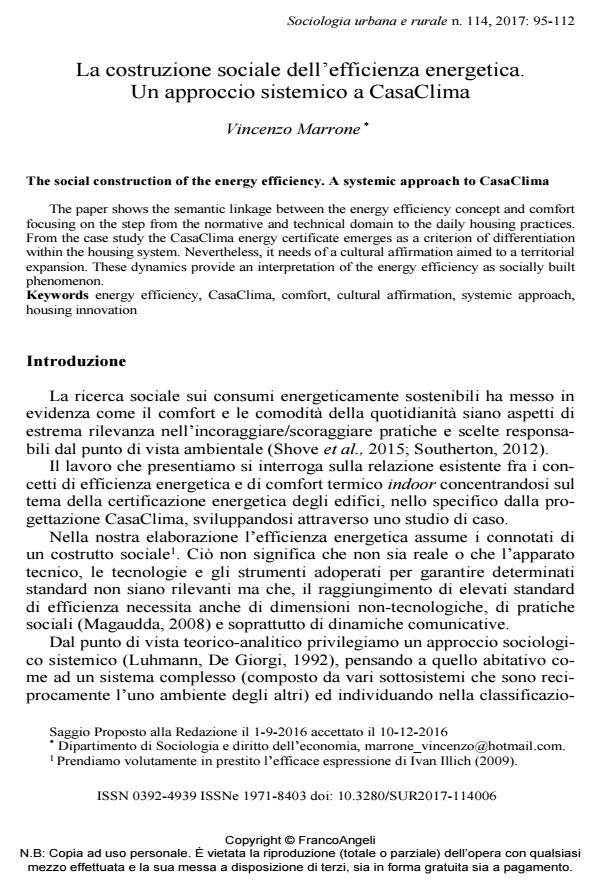The social construction of the energy efficiency. A systemic approach to CasaClima
Journal title SOCIOLOGIA URBANA E RURALE
Author/s Vincenzo Marrone
Publishing Year 2017 Issue 2017/114
Language Italian Pages 18 P. 95-112 File size 403 KB
DOI 10.3280/SUR2017-114006
DOI is like a bar code for intellectual property: to have more infomation
click here
Below, you can see the article first page
If you want to buy this article in PDF format, you can do it, following the instructions to buy download credits

FrancoAngeli is member of Publishers International Linking Association, Inc (PILA), a not-for-profit association which run the CrossRef service enabling links to and from online scholarly content.
The paper shows the semantic linkage between the energy efficiency concept and comfort focusing on the step from the normative and technical domain to the daily housing practices. From the case study the CasaClima energy certificate emerges as a criterion of differentiation within the housing system. Nevertheless, it needs of a cultural affirmation aimed to a territorial expansion. These dynamics provide an interpretation of the energy efficiency as socially built phenomenon.
Keywords: Energy efficiency, CasaClima, comfort, cultural affirmation, systemic approach, housing innovation
- Arpa (2014). La qualità dell’aria in Emilia-Romagna. Testo disponibile al sito https://www.arpae.it/dettaglio_notizia.asp?id=6569&idlivello=134.
- Boni S. (2014). Homo comfort: il superamento tecnologico della fatica e le sue conseguenze. Milano: Elèuthera.
- Brandon G., Lewis A. (1999). Reducing Household Energy Consumption: A Qualitative and Quantitative Field Study. Journal of Environmental Psychology, 19: 75-85.
- Brown L. (2010). Piano B 4.0. Mobilitarsi per salvare la civiltà. Milano: Edizioni Ambiente.
- Carraro C., Mazzai A. (2015). Il clima che cambia. Non solo un problema ambientale. Bologna: il Mulino.
- Carrosio G. (2015). Energia e scienze sociali: stato dell’arte e prospettive di ricerca. Quaderni di sociologia, 66: 107-116.
- Chappells H., Shove E. (2005). Debating the Future of Comfort: Environmental Sustainability, Energy Consumption and the Indoor Environment. Building Research & Information, 1: 32-40. DOI: 10.1080/0961321042000322762
- Clausen C., Gunn W. (2015). From the Social Shaping of Technology to the Staging of Temporary Spaces of Innovation. A Case of Participatory Innovation. Science & Technology Studies, 1: 73-94.
- Cole R.J., Robinson J., Zosia Brown Z., O’shea M. (2008). Re-contextualizing the Notion of Comfort. 4:323-336. DOI: 10.1080/09613210802076328
- Dall’O G. (2010). Abitare sostenibile. Bologna: il Mulino.
- Dake K. (1992). Myths of Nature: Culture and the Social Construction of Risk, Journal of Social Issues, 4: 21-37.
- EEA - European Environment Agency (2015). Air quality in Europe. EEA Report No.5.
- Gadenne D., Sharma B., Kerr D., Smith T. (2011). The influence of consumers' environmental beliefs and attitudes on energy saving behaviours. Energy Policy, 12: 7684-7694.
- Giddens A. (2015). La politica del cambiamento climatico. Milano: Il Saggiatore.
- Hannigan. J (2006). Environmental Sociology. NewYork-London: Routledge.
- Heinberg R. (2004). La festa è finita. La scomparsa del petrolio, le nuove guerre, il futuro dell’energia. Roma: Fazi.
- Horta A., Wilhite H., Schmidt L., Bartiaux F. (2014). Socio-Technical and Cultural Approaches to Energy Consumption. Nature and Culture, 9: 115-121.
- Iarc (2013). Air Pollution and Cancer. Iarc Scientific Publication, 161.
- Illich I. (2009). The Social Construction of Energy. New Geographies, 2.
- Legambiente (2016). Mal’Aria di città 2016. L’inquinamento atmosferico e acustico nelle città italiane. Dossier.
- Lantschner N. (2009). La mia CasaClima: progettare, costruire e abitare nel segno della sostenibilità. Bolzano: Raetia.
- Lorenzoni A. (2012). Il risparmio energetico. Bologna: il Mulino.
- Luhmann N., De Giorgi R. (1992). Teoria della società. Milano: FrancoAngeli.
- Magaudda P. (2008). Cosa intendiamo quando parliamo di «pratiche tecnologiche»? Appropriazione delle tecnologie, processi di consumo e «teoria della pratica». Paper presentato al II Convegno nazionale STS Italia. Università di Genova, 19-21 Giugno.
- Magnani N. (2015). Politiche, agenzie e pratiche di retrofit energetico nelle città. Il caso di Bolzano. Sociologia Urbana e Rurale, 106. DOI: 10.3280/SUR2015-106004
- Olivier J.G.J., Janssens-Maenhout G., Muntean M., Peters J.H.A.W. (2014). Trends in glob-al CO2 emissions. The Hague: PBL Netherlands Environmental Assessment Agency.
- Rifkin J. (2011). La terza rivoluzione industriale: come il “potere laterale” sta trasformando l’energia, l’economia e il mondo. Milano: Mondadori.
- Shove E. (2003). Comfort, Cleanliness, and Convenience: the Social Organization of Normality. Oxford and New York: Berg Publishers.
- Shove E., Chappells H., Lutzenhiser L., Hackett B. (2008). Comfort in a Lower Carbon Society. Building Research & Information, 4: 307-311. DOI: 10.1080/09613210802079322
- Shove E., Watson M., Spurling N. (2015). Conceptualizing connections: Energy demand, infrastructures and social practices. European Journal of Social Theory, 3: 274-287. DOI: 10.1177/1368431015579964
- Shove E., Warde A. (2002). Inconspicuous Consumption: the Sociology of Consumption, Lifestyles, and the Environment. In Dunlap R., Buttel F., Dickens P., Gijswijt A. (eds.). Sociological Theory and the Environment. Oxford: Rowman & Littlefield.
- Southerton D. (2012). Habits, routines and temporalities of consumption: From individual behaviors to the reproduction of everyday practices. Time & Society, 3: 335-355. DOI: 10.1177/0961463X12464228
- Steg L. (2008). Promoting household energy conservation. Energy Policy, 36: 4449-4453.
- Spaargaren G. (2011). Theories of practices: Agency, technology, and culture. Exploring the relevance of practice theories for the governance of sustainable consumption practices in the new world-order. Global Environmental Change, 21: 813-822.
- Energy retrofitting of urban buildings: A socio-spatial analysis of three mid-sized Italian cities Natalia Magnani, Giovanni Carrosio, Giorgio Osti, in Energy Policy 111341/2020 pp.111341
DOI: 10.1016/j.enpol.2020.111341 - Contesto socio-culturale ed efficienza energetica nell'abitazione Jessica Balest, Natalia Magnani, in SOCIOLOGIA URBANA E RURALE 124/2021 pp.83
DOI: 10.3280/SUR2021-124005
Vincenzo Marrone, La costruzione sociale dell’efficienza energetica. Un approccio sistemico a CasaClima in "SOCIOLOGIA URBANA E RURALE" 114/2017, pp 95-112, DOI: 10.3280/SUR2017-114006